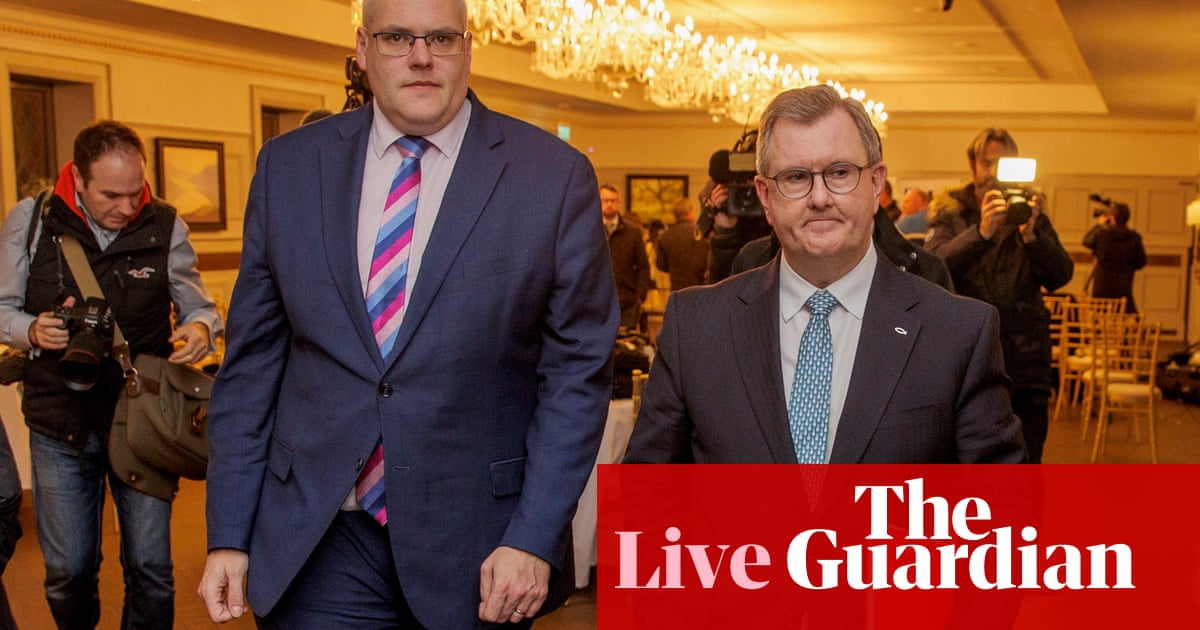Northern Ireland will no longer automatically have to follow EU laws under deal to restore power sharing, DUP leader says
Good morning. Rail strikes are still going on in England, but in one part of the UK a long-running “strike” by key public sector workers seems about to come to an end. DUP MLAs (members of the legislative assembly) have been boycotting power sharing at Stormont for almost two years now. But, following a long and difficult party meeting in private last night (or not quite private – someone was leaking details to loyalist blogger Jamie Bryson, who was tweeting the proceedings in real time), the party is set to resume power sharing after accepting the compromise offer put on the table by the UK government.
The DUP were angry about the Northern Ireland protocol, and the modified version negotiated by Rishi Sunak last year, the Windsor protocol. The DUP supported Brexit, but they were angry about the protocol, and the framework, imposing post-Brexit trading rules affecting goods going from Britain to Northern Ireland. As a result of their two-year Stormont boycott, they have secured some changes to the framework and, as is standard in London negotiations with the Stormont parties, a large wodge of cash for Northern Ireland.
Rory Carroll has the details here.
The UK government has not yet published details of what changes it will make to the framework, but this is how Sir Jeffrey Donaldson, the DUP leader, explained what’s on offer.
[The new deal] will remove checks for goods moving within the UK and remaining in Northern Ireland and will end Northern Ireland automatically following future EU laws.
There will be legislation to provide new legal and practical protections for the Acts of Union and which guarantees unfettered access for Northern Ireland businesses to the rest of the United Kingdom.
In the coming days, in addition to the publication of the details of the new package of proposals, the UK Government will be required to deliver on the legislative commitments they have made to us.
Donaldson also said there was cross-party support for the deal, meaning that the election of a Labour government would not lead to it being reversed. He said:
Regardless of who forms the next UK government, these agreed measures will be taken forward beyond the forthcoming general election.
Here is the agenda for the day.
Morning: Rishi Sunak chairs cabinet.
10am: Kate Forbes, the Scottish government’s former finance secretary, gives evidence to the UK Covid inquiry in Edinburgh. She will be followed by John Swinney, the former deputy first minister.
11am: Sunak is due to be interviewed on ITV’s This Morning.
11.30am: Downing Street holds a lobby briefing.
11.30am: Andrew Mitchell, the development minister and deputy foreign secretary, takes questions in the Commons.
2.30pm: Judge Thomas Teague KC, the chief coroner for England and Wales, gives evidence to the Commons justice committee.
And David Cameron, the foreign secretary, is in Oman, where he is due to give a speech.
If you want to contact me, do try the “send us a message” feature. You’ll see it just below the byline – on the left of the screen, if you are reading on a laptop or a desktop. This is for people who want to message me directly. I find it very useful when people message to point out errors (even typos – no mistake is too small to correct). Often I find your questions very interesting, too. I can’t promise to reply to them all, but I will try to reply to as many as I can, either in the comments below the line; privately (if you leave an email address and that seems more appropriate); or in the main blog, if I think it is a topic of wide interest.
Key events
Deal with DUP won’t stop Britain diverging from EU law, says Northern Ireland minister Steve Baker
It has been reported that the changes to the way the Windsor framework operates proposed as part of the deal to get the DUP to resume power sharing will limit the scope for Britain to diverge from EU laws. (Northern Ireland in effect remains in the EU’s single market, and the more Britain diverges from single market rules, the stronger the case for checks on goods going from Britain to Northern Ireland, where they can easily enter the EU because there are no controls at the Northern Ireland/Ireland border.)
But this morning Steve Baker, a Northern Ireland minister, has insisted that the deal will not stop Britain diverging from single market rules. He has posted these on X.
🤝I welcome this news and I look forward to fulfilling our side of the deal.
❗️For the record there are no commitments of any kind as part of this deal to align GB with EU law; prevent GB from diverging from any retained EU law; or increase alignment in Northern Ireland beyond… https://t.co/bK3TuNNexR
— Rt Hon Steve Baker MP FRSA 🗽 (@SteveBakerFRSA) January 30, 2024
I welcome this news and I look forward to fulfilling our side of the deal.
For the record there are no commitments of any kind as part of this deal to align GB with EU law; prevent GB from diverging from any retained EU law; or increase alignment in Northern Ireland beyond the strictly limited scope Parliament has approved – which is itself subject to democratic consent and safeguards.
And for the avoidance of doubt, there is no legal mechanism to prevent divergence or force alignment across the whole of the UK.
Ministers retain full freedom to diverge from retained EU law.
This is from Michelle O’Neill, the Sinn Féin leader in Northern Ireland and first minister-designate in the power-sharing executive.
I welcome the public declaration by DUP leader Jeffrey Donaldson that power-sharing will now be restored.
The parties will come together later today. We have much to do to confront the challenges facing our public services, workers and families which require urgent action.
I welcome the public declaration by DUP Leader Jeffrey Donaldson that power-sharing will now be restored.
The parties will come together later today. We have much to do to confront the challenges facing our public services, workers and families which require urgent action.— Michelle O’Neill (@moneillsf) January 30, 2024
Some critics of the DUP believe its opposition to power sharing was primarily motivated by its determination not to have a Sinn Féin first minister in Northern Ireland for the first time, although the DUP has denied this.
Irish PM says he has not seen ‘fine detail’ of deal with DUP and wants assurance it won’t undermine Windsor framework
The taoiseach (Irish PM), Leo Varadkar, has welcomed the news that the DUP is willing to resume power sharing in Northern Ireland, while saying he has not seen the “fine detail” of it yet.
Speaking this morning ahead of a meeting of his cabinet, he said that he wanted to be sure that the deal would not undermine the Windsor framework (the revised version of the Northern Ireland protocol, negotiated by London and the EU), but that assumed it wouldn’t.
He told reporters:
At the outset, I want to welcome the news from Co Down that came in the early hours of this morning, news that the DUP is willing to re-enter the power-sharing executive in Northern Ireland.
That’s really important because it means that devolved democratic government can be restored in Northern Ireland and the executive can get down to the hard work of dealing with some of the everyday problems that people face north of the border …
I hope to speak to the prime minister later on today to discuss matters a little bit further.
I should say that while there have been consultations between the European Commission, the Irish government and the British government from the last number of months, we haven’t seen the fine detail of what’s been agreed just yet.
So obviously we’ll need to see that and and be confident that it doesn’t have any negative consequences for the Windsor framework or for the Good Friday agreement.
I don’t anticipate that it does but we have to see the exact detail of that first.
UK will consider recognising Palestinian state, says David Cameron
David Cameron, the foreign secretary, has said that Britain will consider recognising a Palestinian state as part of concerted efforts to bring about an “irreversible” peace settlement. Ben Quinn has the story.
Here is Archie Bland’s explainer on the Northern Ireland deal from his First Edition briefing.
And here is his post on what happens next.
There is an 8 February legislative deadline for forming an administration at Stormont. Sinn Féin’s leader, Mary Lou McDonald, expressed optimism that that could now be met, and said that “Sinn Féin will now engage with the parties and both governments to ensure we now all press on without delay”.
The deal underpinning the DUP’s decision is yet to be published and will be examined by Conservative MPs for any sign that it weakens the UK’s ability to diverge from EU rules. But it is expected to be passed in Westminster. Meanwhile, there may be more expressions of opposition from unionist hardliners in the days ahead – and there is at least some risk of a party split within the DUP if those concerns cannot be allayed.
Nonetheless, [the Northern Ireland secretary, Chirs] Heaton-Harris expressed optimism that the assembly will soon return, and get Stormont back to the business of governing. “The parties entitled to form an executive are meeting tomorrow to discuss these matters,” Heaton-Harris said. “I hope to be able to finalise this deal with the political parties as soon as possible.”
Northern Ireland will no longer automatically have to follow EU laws under deal to restore power sharing, DUP leader says
Good morning. Rail strikes are still going on in England, but in one part of the UK a long-running “strike” by key public sector workers seems about to come to an end. DUP MLAs (members of the legislative assembly) have been boycotting power sharing at Stormont for almost two years now. But, following a long and difficult party meeting in private last night (or not quite private – someone was leaking details to loyalist blogger Jamie Bryson, who was tweeting the proceedings in real time), the party is set to resume power sharing after accepting the compromise offer put on the table by the UK government.
The DUP were angry about the Northern Ireland protocol, and the modified version negotiated by Rishi Sunak last year, the Windsor protocol. The DUP supported Brexit, but they were angry about the protocol, and the framework, imposing post-Brexit trading rules affecting goods going from Britain to Northern Ireland. As a result of their two-year Stormont boycott, they have secured some changes to the framework and, as is standard in London negotiations with the Stormont parties, a large wodge of cash for Northern Ireland.
Rory Carroll has the details here.
The UK government has not yet published details of what changes it will make to the framework, but this is how Sir Jeffrey Donaldson, the DUP leader, explained what’s on offer.
[The new deal] will remove checks for goods moving within the UK and remaining in Northern Ireland and will end Northern Ireland automatically following future EU laws.
There will be legislation to provide new legal and practical protections for the Acts of Union and which guarantees unfettered access for Northern Ireland businesses to the rest of the United Kingdom.
In the coming days, in addition to the publication of the details of the new package of proposals, the UK Government will be required to deliver on the legislative commitments they have made to us.
Donaldson also said there was cross-party support for the deal, meaning that the election of a Labour government would not lead to it being reversed. He said:
Regardless of who forms the next UK government, these agreed measures will be taken forward beyond the forthcoming general election.
Here is the agenda for the day.
Morning: Rishi Sunak chairs cabinet.
10am: Kate Forbes, the Scottish government’s former finance secretary, gives evidence to the UK Covid inquiry in Edinburgh. She will be followed by John Swinney, the former deputy first minister.
11am: Sunak is due to be interviewed on ITV’s This Morning.
11.30am: Downing Street holds a lobby briefing.
11.30am: Andrew Mitchell, the development minister and deputy foreign secretary, takes questions in the Commons.
2.30pm: Judge Thomas Teague KC, the chief coroner for England and Wales, gives evidence to the Commons justice committee.
And David Cameron, the foreign secretary, is in Oman, where he is due to give a speech.
If you want to contact me, do try the “send us a message” feature. You’ll see it just below the byline – on the left of the screen, if you are reading on a laptop or a desktop. This is for people who want to message me directly. I find it very useful when people message to point out errors (even typos – no mistake is too small to correct). Often I find your questions very interesting, too. I can’t promise to reply to them all, but I will try to reply to as many as I can, either in the comments below the line; privately (if you leave an email address and that seems more appropriate); or in the main blog, if I think it is a topic of wide interest.







